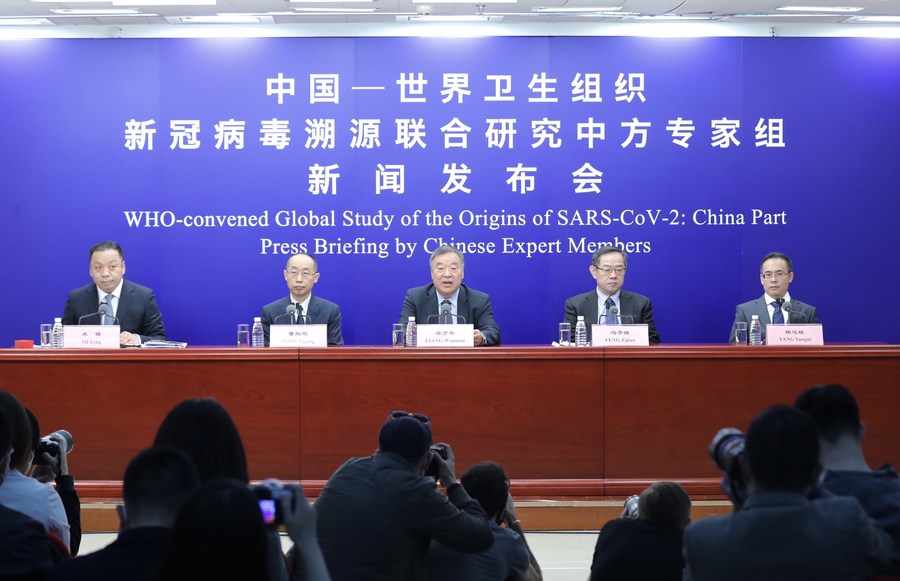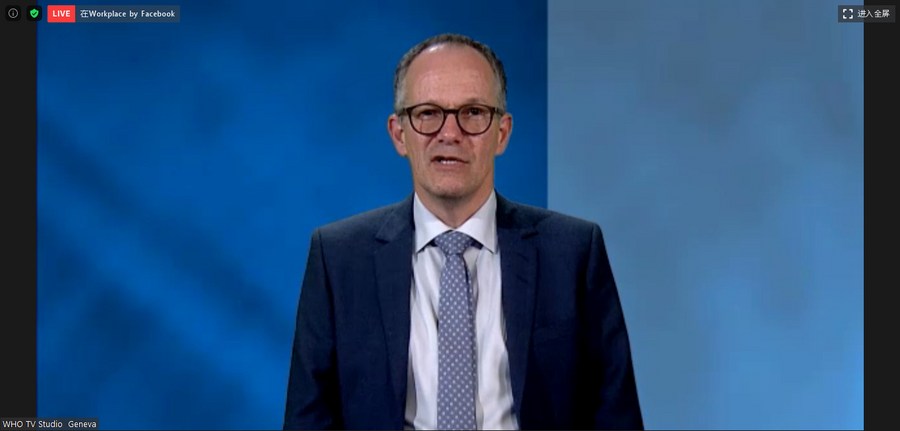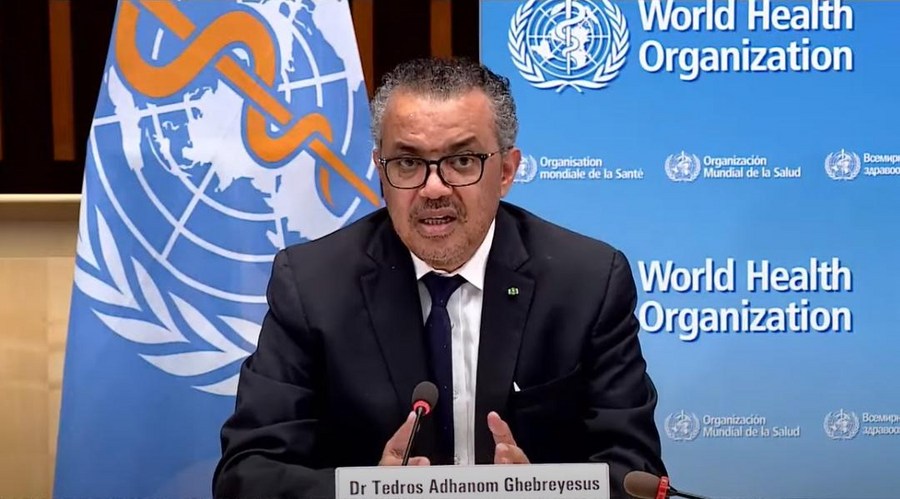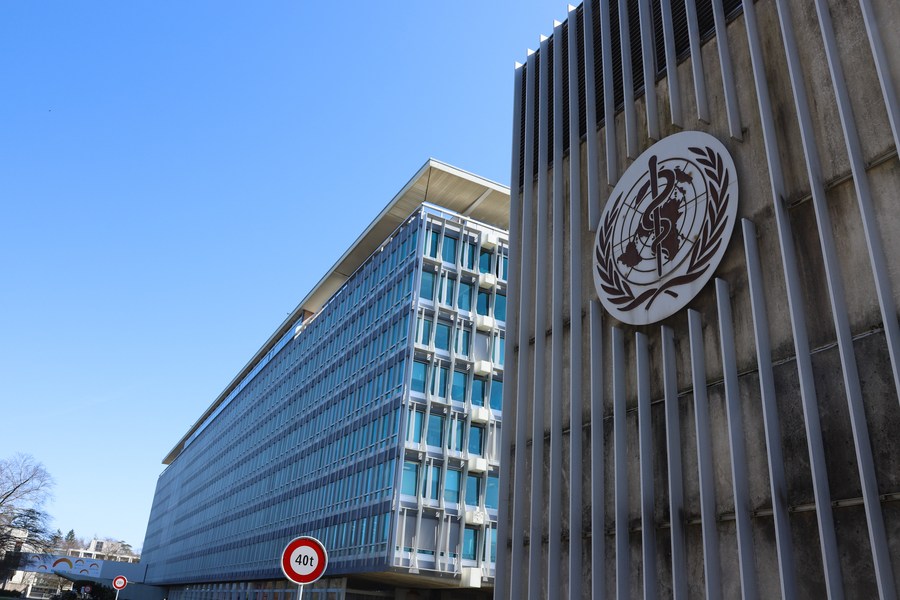Stop politicizing COVID-19 origins: more scientists speak out
-- As the global vaccination rollout brings light to countries wrapped in a COVID-19 darkness, an emerging "political virus" has cast a shadow on the origins of the disease.
-- Some Western politicians have cooked up the lab-leak hypothesis to blame China and unleash intense waves of disinformation about the disease's origins, which have drawn criticism from the science community.
-- Scientists are increasingly worried about the consequences of unfounded allegations, which will hinder origin-tracing work and undermine preparations for the next pandemic.
BEIJING, July 13 (Xinhua) -- As the global vaccination rollout brings light to countries wrapped in a COVID-19 darkness, an emerging "political virus" has cast a shadow on the origins of the disease.
As of Tuesday morning, more than 187 million people around the globe have contracted the virus, with more than 4 million lives lost.
However, some self-interested Western politicians are concocting conspiracy theories and spreading misinformation about the origins of the deadly virus, including the tired lab-leak hypothesis. Such unsubstantiated notions do nothing but distract researchers dedicated to learning how and where the contagion began.
Scientists worldwide have spoken out against practices of politicizing the origins of COVID-19.

Chinese expert members of a WHO-China joint team introduce the report on the WHO-convened global study of COVID-19 origins at a press briefing in Beijing, capital of China, March 31, 2021. (Xinhua/Zhang Yuwei)
OPEN QUESTION
How and when the novel coronavirus reached "patient zero" remains unanswered.
Evidence has begun to emerge that COVID-19 had been circulating around the world earlier than the pathogen was first reported in the central Chinese city of Wuhan.
In mid-June, a new antibody testing study by the U.S. National Institutes of Health, which analyzed more than 24,000 blood samples from all 50 U.S. states between Jan. 2 and March 12, 2020, found evidence of SARS-CoV-2 infections in the country earlier than initial reports, which date back to late December 2019.
In early June, the World Health Organization requested an Italian research team re-test the samples in their study. Last November, Italy's National Cancer Institute reported that it found evidence of COVID-19 antibodies in the blood of four Italian cancer test subjects in October 2019, meaning they would have been infected by the virus in September, while the first known patient in Italy was detected with infection on Feb. 21, 2020.
Dominic Dwyer, an Australian virologist with the University of Sydney, thinks that animals are the likely source of COVID-19, but it remains overhasty to reach a definitive conclusion right now, saying "the 'gotcha' evidence still eludes in what can take years."
In the view of David Fidler, a global health researcher with the Council on Foreign Relations, a Washington-based think tank, it's hard to expect COVID-19 origin investigations to reveal definitive data any time soon, according to a report published in the science journal Nature in late May.
The origins of most Ebola outbreaks remain mysterious, and researchers have spent 14 years nailing down evidence that the 2002-04 SARS epidemic was caused by a virus transmitted from bats to civets to humans, Fidler said.

The video screenshot taken on March 30, 2021 shows Peter K. Ben Embarek, leader of an international team of experts to Wuhan, attending a virtual press conference. (Xinhua)
FOLLOW SCIENCE
In late March, the WHO released a report on the global tracing of COVID-19 origins, following a 28-day joint study in Wuhan by 34 experts from the WHO and China.
The experts assessed the likelihood of possible pathways, saying COVID-19 introduction through an intermediate host is "likely to very likely," through cold/food chain products "possible," and through a laboratory incident "extremely unlikely."
Calling the report "a very important beginning," WHO Director-General Tedros Adhanom Ghebreyesus said: "We have not yet found the source of the virus, and we must continue to follow the science and leave no stone unturned as we do."
Nonetheless, some Western politicians have cooked up the lab-leak hypothesis to blame China and unleash intense waves of disinformation about the disease's origins, which have drawn criticism from the science community.
Danielle Anderson, who has extensive experience in bat-borne virus research, is the only foreign scientist to have worked in the high-security BSL-4 lab of the Wuhan Institute of Virology. In an interview with Bloomberg in June, Anderson rejected the lab-leak theory, saying, "If people were sick, I assume that I would have been sick -- and I wasn't.
Anderson also said that no one she knew at that time was ill. "We went to dinners together, lunches. We saw each other outside of the lab," said the virologist, who feels "dumbfounded by the portrayal of the lab by some media outside China, and the toxic attacks on scientists that have ensued."
Furthermore, Vladimir Dedkov, deputy director for scientific work at Russia's Pasteur Research Institute of Epidemiology and Microbiology, recently told Xinhua that if the hypothesis of an artificial origin is investigated, then it is necessary to investigate all laboratories with viruses of this type, not only in China, but in other countries.
Only scientists who rely on international cooperation can clarify the question of the origins of new viruses, he added.

The video screenshot taken on May 7, 2021 shows World Health Organization (WHO) Director General Tedros Adhanom Ghebreyesus attending a press briefing in Geneva, Switzerland. (Xinhua)
POLITICAL HINDERANCE
Some non-scientists are rushing to fabricate evidence in the name of science. U.S. President Joe Biden has tasked the U.S. intelligence community to produce a report on the origins of COVID-19 within 90 days, instead of offering assistance to the WHO and facilitating the worldwide hunt for the source of the virus, including in his own country.
Meanwhile, scientists are increasingly worried about the consequences of unfounded allegations, which will hinder origin-tracing work and undermine preparations for the next pandemic.
Earlier this month, two dozen prominent international scientists reiterated their belief that the coronavirus evolved naturally rather than escaped from a lab, in a letter published in The Lancet medical journal.

Photo taken on March 30, 2021 shows an exterior view of the headquarters of the World Health Organization (WHO) in Geneva, Switzerland. (Xinhua/Chen Junxia)
"Allegations and conjecture are of no help, as they do not facilitate access to information and objective assessment of the pathway from a bat virus to a human pathogen that might help to prevent a future pandemic," they wrote. "Recrimination has not, and will not, encourage international cooperation and collaboration."
"I concur with the many scientists who say that politicizing the science does not help genuine efforts to identify the origins of SARS-CoV-2, or ongoing collaboration between Chinese and Western scientists," said Hume Field, a science and policy advisor for China and Southeast Asia at EcoHealth Alliance in New York.
It just generates "doubt" and "mistrust" and fundamentally undermines the united global effort needed to prevail against the virus and the pandemic, Field told Xinhua.
Similarly, Dedkov said politicizing the topic is purely counterproductive, urging his colleagues to work together to find the cause of the pandemic instead of blaming China without proof.
Photos
Related Stories
- Scholar says COVID-19 evolved naturally, dismisses lab leakage theory
- 11 bln doses needed to vaccinate 70 pct of world to end COVID-19: UN chief
- Xi says China to help Ukraine beat pandemic
- Providing 500 mln vaccine doses to world, China aims to enhance int'l cooperation against COVID-19
- Over 1.39 bln doses of COVID-19 vaccines administered in China
Copyright © 2021 People's Daily Online. All Rights Reserved.










